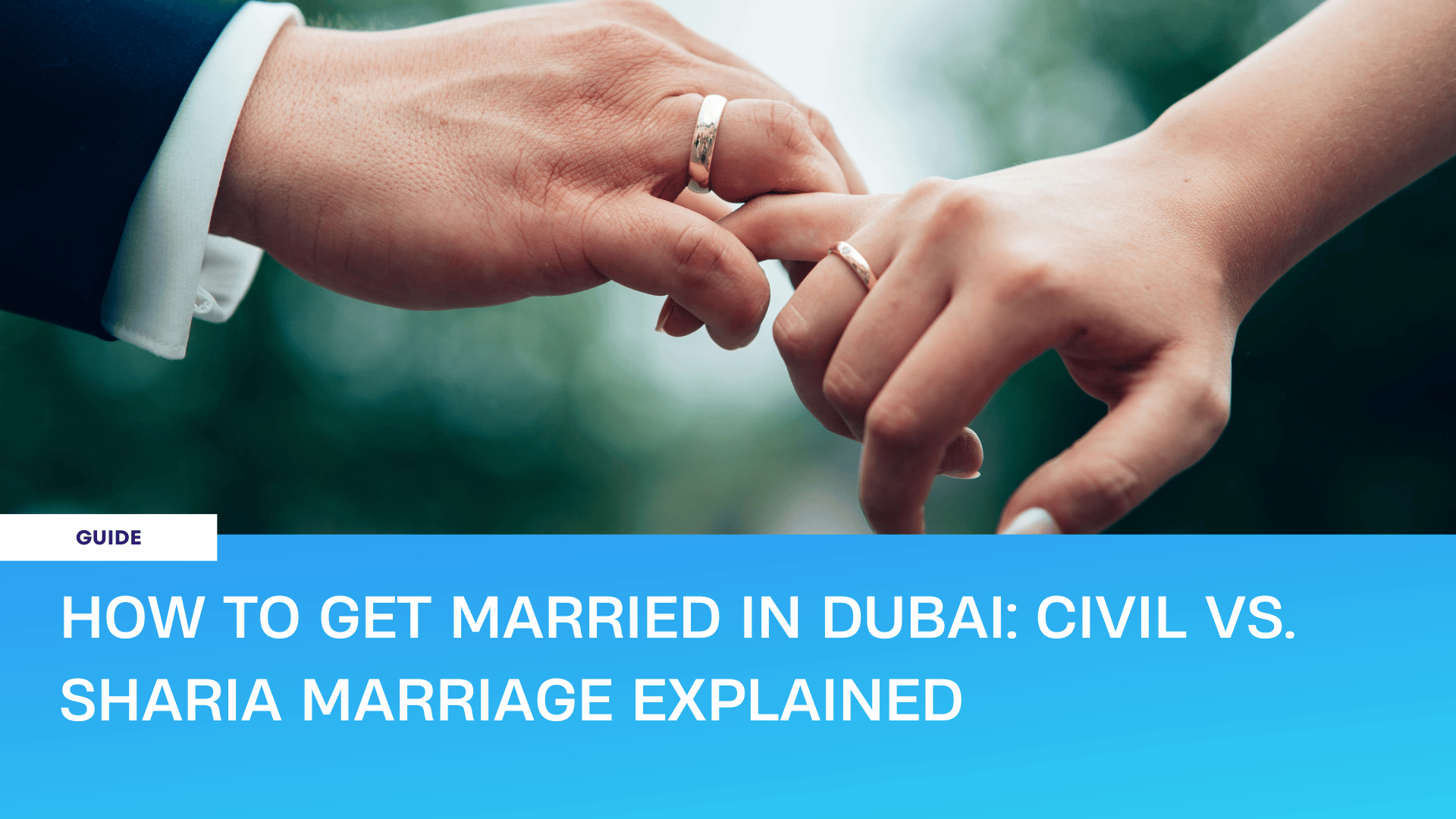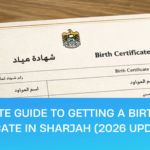Marriage in Dubai: Civil vs. Sharia Marriage Explained

Marriage in Dubai: An Overview
Dubai is well known as a city filled with various cultures and nationalities, offering two legal ways in getting married: Sharia Marriage (also known as “Nikah”) and Civil Marriage.
Whether you are a UAE resident or a tourist planning to tie the knot, understanding these options is the key to ensure a smooth and legally recognized marriage.
What is a Sharia Marriage?
Sharia marriage (also known as “Nikah”) follows the Islamic provisions and principles. It is based on the mutual consent between a Muslim man and a woman. Moreover, it is both a legal and social contract that outlines the rights and responsibilities of both spouses under the Sharia Law.
What is a Civil Marriage?
A civil marriage is a lawful union between two individuals solemnized as a civil contract under secular rules, regardless of religion and nationality. Unlike Sharia marriages, it does not involve religious ceremonies and is primarily intended for non-Muslim residents and tourists, making it a recommended option for those who do not follow Sharia law.
Civil Marriage in Dubai: Eligibility and Requirements
Dubai has introduced a Civil Marriage service for non-Muslims, allowing couples to get a marriage license in as fast as 24 hours. The Abu Dhabi Judicial Court Department also offers civil marriage services under Abu Dhabi Law No. 14 of 2021, making the process legally efficient.
Conditions for Civil Marriage in Dubai:
- Both parties must be non-Muslims.
- At least one party must be a resident of Dubai.
- The couple must be at least 21 years old.
- Both individual (or their legally authorized representatives appointed by a Power of Attorney (POA)) must appear in person.
- Original identification documents (such as passport and/or EID) are required.
- A proof of single status issued by both couple’s embassy or consulate is a must.
Who Can Apply for a Civil Marriage?
Any non-Muslim couples – who meets the above conditions can apply for a Civil Marriage. If either of the couple was previously married, a divorce certificate (if divorced) or a death certificate (if widowed) is required. If these documents are issued outside the UAE, they must be fully attested and Arabic translated.
Sharia Marriage in Dubai: Key Requirements
For Muslim couples opting for a Sharia marriage, the following conditions must be met:
- Emirates ID and Passport copies for both bride and groom.
- A premarital screening certificate from an approved UAE health facility. For more details, you may visit EHS website: https://www.ehs.gov.ae/en/services/services-directory/premarital-counseling-and-screening
- Physical presence of both bride and groom.
- Bride’s guardian (Wali) must be present, along with two Muslim male witnesses.
- If the bride’s father is unavailable to attend the ceremony, the next male guardian (brother, uncle, cousin, etc.) must be appointed via a Power of Attorney (POA). 👉 Learn more about why a POA for marriage is required in the UAE here.
- If the bride is divorced or widowed, she must provide an attested Divorce Certificate (if divorced) or Death Certificate of her late husband (if widowed).
- If the bride is Muslim but her father is a non-Muslim, a No Objection Certificate (NOC) from her embassy or consulate is required.
Understanding Sharia Marriage Rules
In the UAE, Sharia marriage applies in the following cases:
- Wherein both the bride and groom are Muslims.
- Wherein the groom is Muslim, and the bride is of Christian or Jewish faith (Ahl Al-Kitaab).
- A Muslim woman cannot marry a non-Muslim man unless he converts to Islam and provides proof.
- Polygamy is permitted for Muslim men, with a limit of up to four wives, provided that each wife is treated equally in terms of financial and emotional support and care.
Comparing Civil and Sharia Marriage in Dubai
Legal Process for Civil Marriage:
✅ Step 1: Eligibility Check – Both partners must be non-Muslims and at least 21 years old.
✅ Step 2: Submit Required Documents – Passports, Emirates IDs (if applicable),e-visa / visa entry stamp (for non UAE residents) , proof of marital status.
✅ Step 3: Application Submission – Apply online or visit any Dubai Personal Status Courts.
✅ Step 4: Civil Ceremony – A simple court ceremony is conducted by a judge.
✅ Step 5: Marriage Certificate Issuance – The official civil marriage certificate is issued and legally recognized inside and outside the UAE.
💡 Key Points:
- No religious approval required.
- Open to UAE residents of different nationalities and faiths.
- A female applicant does not need a guardian’s consent for civil marriage.
Legal Process for Sharia Marriage:
✅ Step 1: Eligibility Check – The groom must be Muslim, while the bride can be Muslim, Christian, or Jewish.
✅ Step 2: Submit Required Documents – Passports, Emirates IDs, and premarital medical certificates, proof of marital status (if divorced or widowed)
✅ Step 3: Marriage Contract Signing – Conducted in the presence of:
- An authorized Sharia judge (Qadi)
- Two Muslim male witnesses
- The bride’s guardian (Wali)
✅ Step 4: Marriage Certificate Issuance – The couple receives an official Sharia marriage contract recognized under Islamic law.
💡 Key Points:
- Follows Islamic laws and traditions.
- Requires the bride’s Wali (guardian) consent.
- Can be done at Dubai Courts – Personal Status Court, or authorized Islamic centers or the preferred venue of the Nikah.
Which Marriage Option is Right for You?
- If both partners are non-Muslims, a civil marriage is the best option.
- If both partners are Muslims, or the groom is Muslim wiling to get married to a Christian or a Jewish bride, a Sharia marriage is required to comply with Islamic traditions and UAE law.
Documents Needed for Marriage Registration in Dubai
Civil Marriage Checklist:
- Passports
- Emirates IDs (if UAE residents)
- Active UAE Pass App
- Proof of singleness issued by the country’s Consulate or Embassy
Sharia Marriage Checklist:
- Passports
- Emirates IDs (if UAE residents)
- Premarital medical certificate
- Bride’s guardian’s approval
- Two Muslim male witnesses
- Proof of marital status (if divorced/widowed) – fully attested and Arabic translated if issued outside the UAE
Marriage for Expats in Dubai: Key Considerations
Legal Recognition Abroad
Both Sharia and Civil marriages are legally recognized outside the UAE, provided they are fully attested by UAE Ministry of Foreign Affairs and the embassy or consulate of the couple’s home country.
Rights and Protections
Civil Marriage:
- Ensures equal rights for both spouses.
- Allows joint child custody until the child reaches 18 years old.
- Provides equal inheritance rights under UAE Federal Decree-Law No. (41) of 2022.
Sharia Marriage:
- Requires the groom to provide a dowry (Mahr), which cannot exceed AED 20,000 in advance and AED 30,000 deferred.
- Ensures that the husband provides financial support (housing, food, medical care, etc.).
- Recognizes the bride’s right to consent, retain personal property, and pursue education and career aspirations.
Disclaimer: The content on this page is for general information purposes only and does not constitute as legal advice nor should it be used as a basis for any specific action or decision. Nothing on this page or website is to be considered as rendering of legal advice or legal services for any specific matter. Users of this website are advised to seek specific legal advice by contacting a lawyer regarding any specific legal issues.





